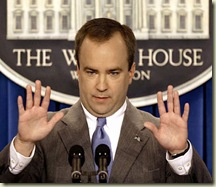 Shock-jock Don Imus has broadcast below radar through much of the Aughts, with no major controversies to push him into the national limelight. However, Imus and crew's remarks concerning the Rutgers Women's Basketball Team in early April 2007 have once again brought the country's eye (and ear) to Imus in the Morning, the long-lived deejay's flagship broadcast.
Shock-jock Don Imus has broadcast below radar through much of the Aughts, with no major controversies to push him into the national limelight. However, Imus and crew's remarks concerning the Rutgers Women's Basketball Team in early April 2007 have once again brought the country's eye (and ear) to Imus in the Morning, the long-lived deejay's flagship broadcast.
After the Tennessee-Rutgers Women's NCAA Basketball Championship game, Imus in the Morning featured a section of commentary on the game that dealt less with the athletic achievements in the contest than the normative beauty of the contestants.1
IMUS: That’s some rough girls from Rutgers. Man, they got tattoos and...
McGUIRK: Some hard-core hos.
IMUS: That’s some nappy-headed hos there.
UNIDENTIFIED VOICE IN BACKGROUND: Oh, oh, oh, man.
IMUS: I’m gonna tell you that now, man, that’s some...whoo. And the girls from Tennessee, they all look cute, you know, so, like, kinda like, I don’t know.2
McGUIRK: A Spike Lee thing.
IMUS: Yeah.
McGUIRK: The Jigaboos vs. the Wannabes, that movie that he had.
IMUS: Yeah, it was a tough...
McCORD: Do The Right Thing.3
McGUIRK: Yeah, yeah, yeah.
IMUS: I don't know if I'd have wanted to beat Rutgers or not, but they did, right?
ROSENBERG: It was a tough watch. The more I look at Rutgers, they look exactly like the Toronto Raptors.
IMUS: Well, I guess, yeah.
RUFFINO: Only tougher.
(April 4th edition of MSNBC's Imus in the Morning)
Those who object to Imus & Company's language point to the phrases "hard-core hos," "nappy-headed hos," "the Jigaboos vs. the Wannabes," and (most-inexplicably) "they look exactly like the Toronto Raptors." Each phrase is alleged to be racially-based, and Imus & company's usage is alleged to reflect racial bias. For these usages, critics from Reverend Jesse Jackson to Reverend Al Sharpton to ESPN.com-columnist Jemele Hill have called for Imus' termination.
This is not the first time that Imus has been at the center of such a controversy. In the past, Imus has referred to sports columnist Bill Rhoden as a "
New York Times quota hire" and PBS anchor Gwen Ifill as a "cleaning lady."
4 In a more high-profile instance, according to Media Matters in America, "in June 2001 [Rosenberg made racial comments] about Venus and Serena Williams, two African-American female professional tennis players. According to a November 20, 2001,
Newsday article, Rosenberg said on the air: 'One time, a friend, he says to me, 'Listen, one of these days you're gonna see Venus and Serena Williams in Playboy.' I said, 'You've got a better shot at National Geographic.'' Rosenberg also referred to Venus Williams as an 'animal.'"
5 These comments are far more egregious than the exchange concerning Rutgers.
Many critics gloss the fact that "ho" is now widely used in American vernacular, a result of its rampant usage in a former object of these same critics' ire, hip-hop music and culture. Whatever the cause, many men and women from disparate racial, ethnic, and class backgrounds now refer to women of all virtues and professions as "hos." While the mainstream usage in hip-hop may have, at the beginning of the word's dissemination, indicated African-American women, current usage no longer restricts the meaning in this way. For good or ill, "ho" is an epithet applied equally across racial and ethnic lines. Thus, Rosenberg's use of "ho" is perhaps a dig at the women's moral virtue, a presumption based upon Imus's reference to their tattoos, once a sign of the presumed "hardness" of the bearer.
When Imus refines Rosenberg's comment, calling the team "nappy-headed hos," he provides his critics with clear evidence of racist thinking. Nappy, as an adjective, means "kinky," and dominant American culture has long considered this "kinky-ness," attributed specifically to the qualities of many African Americans' hair, to be an aberration of normative (i.e. European in origin) beauty. However, Imus claims that the Lady Volunteers "all look cute." While Imus's critics have pointed to the percentage of African-American players on Rutgers as an indication of his racist intent, these critics do not mention that Imus considers attractive a team that has approximately the same percentage of African-American players. Thus, by examining his actual discourse, Imus does not criticize Rutgers players because they are African American, but because, in part, of how they adorn themselves.
6 This distinction is subtle, but important.
Few listeners or viewers could endure the usage of "jigaboos" without raising an eyebrow or spitting out their coffee, yet the usage of "Jigaboos versus the Wannabes" is also problematic for non-racist reasons. "Jigaboo" is unequivocally a racial slur aimed at dehumanizing an African American by defining him or her as a caricature built upon presumptive physical features.
7 However, this usage comes in the form of a quotation from a Spike Lee film,
School Daze, in which Lee lampoons intra-racial conflicts on a college campus. In the same way that wide usage of the word "nigger" in various media reporting on or disseminating hip-hop music and culture has brought this inflammatory slur into common, but contentious, usage once again, Lee's satirical usage has as a byproduct the effect of rendering the term "jigaboo" acceptable for continued ironic usage. That this term in this particular instance was uttered by a Caucasian male is not insignificant.
Finally, Imus and company claim that the Rutgers women's team looks like the Toronto Raptors, an NBA franchise composed entirely of males. Here, Rosenberg is claiming that Rutgers appear presumptively mannish. While this is, perhaps, offensive with respect to gender, this claim in no way suggests a racial bias.
8Imus's claims, and his colleagues' claims, were tasteless. However, when ESPN-columnist Jemele Hill asks her readers to "
Take a stand against indecency and cruelty," one wonders what form that stand should take.
9 In a preemptive strike against a part of this very argument, Hill claims:
I'm still boiling because too many people continue to defend Imus behind lame free-speech arguments -- remember, speech is free, but consequences are not -- and the idea that black women just don't know a good joke when they hear one. Tell you what, if this "nappy-headed ho" comment is as harmless as some of you say it is, say that phrase to your wives and girlfriends tonight (or even a woman on the street). If they laugh, I'll write an entire column about how humorless I am. (Hill)
In part, I agree with her. The comments are demeaning to these specific women: they claim that the women on the Rutgers team are ugly and that they look like men. The comments are not funny. However, these two facts do not supersede the First Amendment (although in recent years the Constitution and the Bill of Rights are often treated like so many comic strips adhering to the skin of Sill-Putty), and Hill's claims amount to legislation based upon matters of taste.
Under the U.S. Constitution, Americans are granted the freedom to be tasteless, mean-spirited, and abrasive. The guarantee of these freedoms comes part and parcel with the guarantee for other, more socially-acceptable freedoms. A person's right to be a dullard, a bore, a misogynist, a racist, a [fill in your own unpleasant iteration of humanity], is held to be unrestrictable, for in time tastes change and today's enlightened discourse might become tomorrow's restrictive language (one need only think about early twentieth-century eugenics discourse as a model of "progressive thinking" turned atrocity-in-waiting). If one determined legality based upon contingent tastes in a given time, one shudders to think about the advances in gender and racial equality that
would not have occurred in a largely patriarchal and racist America.
10Thus, calling for Imus's termination because of alleged racially-insensitive commentary misses the mark. Termination is an overly-simplified solution to a larger problem. An intelligent discourse about the impropriety of his remarks, a public condemnation of his actions (which is taking place through his two-week suspension that is, conveniently, only to begin next week after stations and networks can figure out what to air in his absence) will do more to eliminate these kinds of sentiments and their easy enunciation in the future than simply sacking him.
Let's imagine this hypothetical situation: A group of white supremacists take offense at Reverend Al Sharpton's pro-African American discourse and his criticism of racially-biased speech and demand his immediate resignation or removal from office. As a culture, we would dismiss this claim outright not just because white supremacy is at the forefront of cultural distaste (and is often linked to measurable detrimental effects upon minority cultures), but because their claim has no constitutional or legal basis; it is made upon taste alone, and we would dismiss it outright due to its foundation. Organize, we might tell them (if we acknowledged them at all), and have him voted out if you feel so strongly.
Consider the reaction to Doctor Laura Schlessinger's anti-gay comments on her syndicated talk-radio show. Because of her tasteless remarks, critics called for a boycott of her show and her show's sponsors, and this opposition had measurable success. Not only was Doctor Laura censured for her remarks (remarks which she is fully free to espouse despite how hurtful they might be), but the assumptions conditioning her discourse were brought into the national consciousness and productive discussions resulted from them.
Ideally, the aftermath of Imus' apology and his meetings with Sharpton, the players, and so on, will result in a wider understanding of the implications of all our utterances and an attempt to choose language that most-accurately reflects what we are trying to say. Although with the popularity of comics like alleged-plagiarist Carlos Mencia, a comic who "reclaims" ethnicity and race by utilizing many racist assumptions in his jokes (and let's not even mention the way he targets people with disabilities, because, well, no one cares about them, right?) the outlook is not so bright.
If Imus, in the future, does not change, those of us who disagree with the spirit of his discourse will shake our collective head sadly. If, however, he does change and racial tolerance is in some way advocated to his broad audience, real progress will have been made.
1 The WNBA itself adds to this confusion, often promoting its players, and thereby itself, based upon their mediagenecity: players in presumably seductive outfits who claim that they aren't "as sweet as you think," etc.
 2
2 Candace Parker, the media focal point on the Tennessee Lady Vols, is a phenomenal player, capable of taking over a game and dominating opposing teams. She is, however, surrounded by other standout players, like Shannon Bobbitt and Aleix Hornbuckle, that allow her to dominate. Look for Parker on the cover of the SI Commemorative Issue.
3The correct Spike Lee joint is, of course,
School Daze.
4 Davis, April. "Debate continues about boundaries for inflammatory talk radio."
First Amendment Center 28 July 2000. 10 April 2007. http://www.firstamendmentcenter.org/news.aspx?id=6162
5 Chiachiere, Ryan. "Imus called women's basketball team 'nappy-headed hos.'"
Media Matters for America 4 Apr. 2007. 10 Apr. 2007. http://mediamatters.org/items/200704040011
6 The Lady Volunteers may be equally tattooed as Rutgers, but based upon what Imus and company
actually said, the perception is that they are not. New Critical theory has taught us nothing if not to distrust and discount an author's intent.
7 The
Oxford English Dictionary identifies the first usage of this term in the 1909 Weston & Barnes song "
I've Got Rings on My Fingers."
8In fact, the Toronto Raptors are arguably the most heterogeneous team in the NBA; the roster is comprised of a mix of races and ethnicities, including African American, Caucasian, Spanish, Slovenia, and Italian.
9 Hill, Jemele. "Take a stand against indecency and cruelty."
ESPN.com: Page 2 10 Apr. 2007. 10 Apr. 2007. http://sports.espn.go.com/espn/page2/story?page=hill/070410
10Hill is not without contemporary precedent. The logic of her argument is preceded by President Bush's withdrawal of the United States from the 1972 Anti-Ballistic Missile treaty: "'The 1972 ABM treaty was signed by the United States and the Soviet Union at a much different time, in a vastly different world,' [Bush] said" (
CNN.com).
Full Disclosure: I do not listen to Imus (or any other shock-jock, for that matter). I think he is impossibly sanctimonious (a common trait among pundits and shock jocks alike), and that characteristic, mixed with his patent non-funny banter, makes me turn the dial or the television station each time I hear or see him.




































